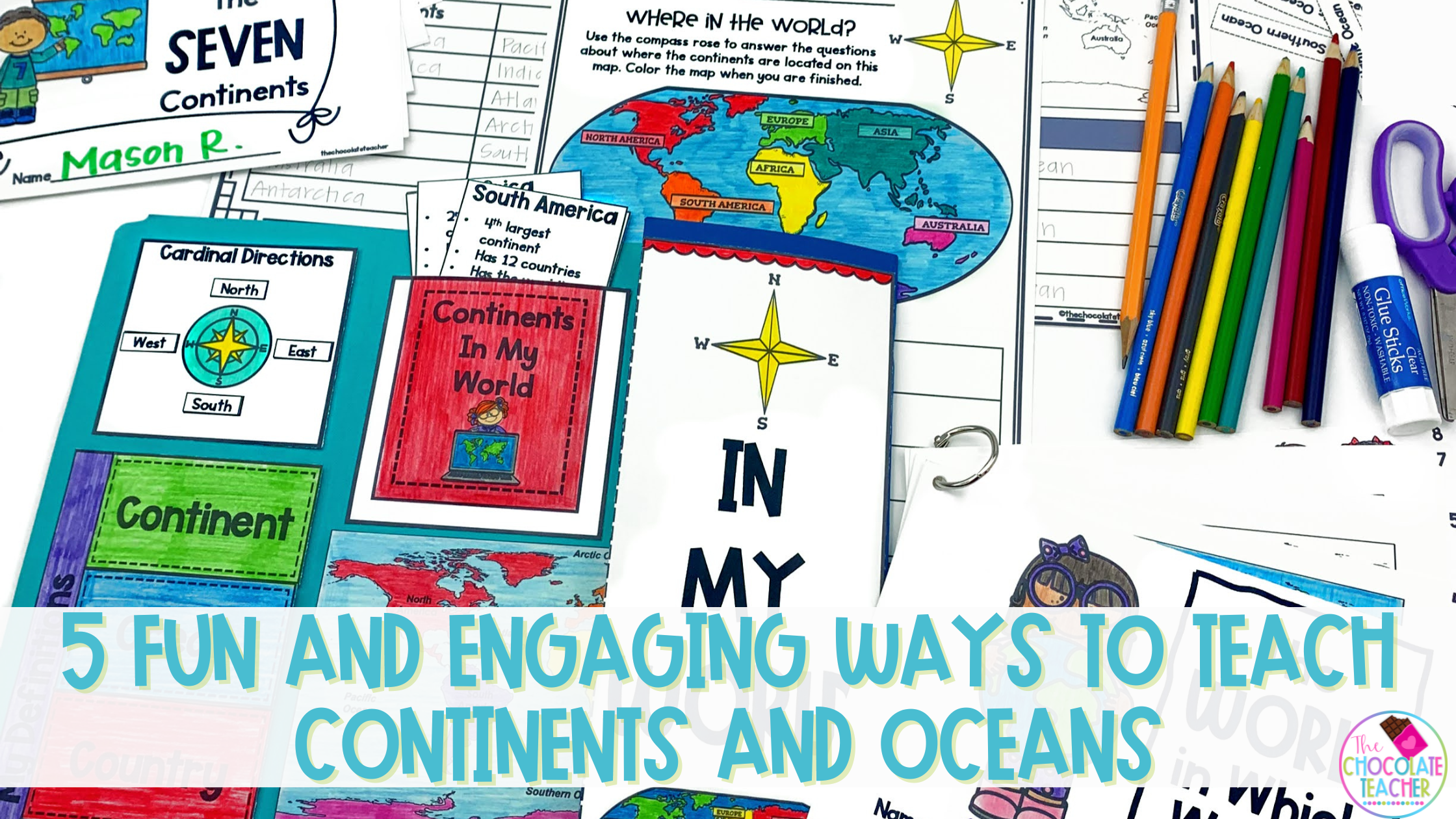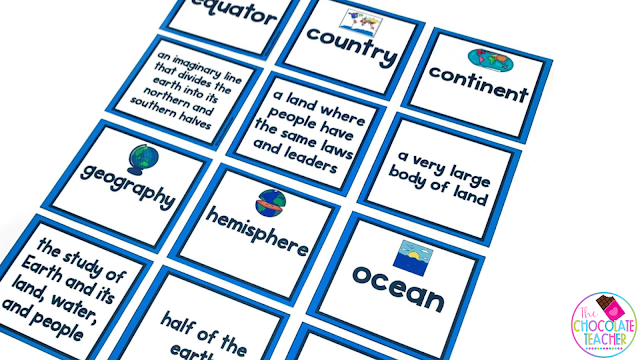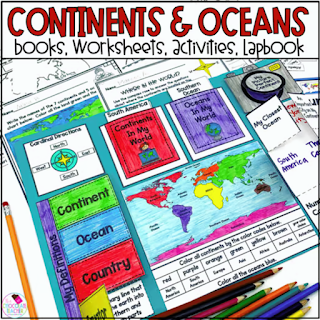One of the important concepts we teach in early elementary is about the great big world we live in. Students will learn about the world beyond where they live, digging into countries, continents, oceans, and more. There is a lot to learn so it is important to provide fun and engaging activities that will teach them the skills and help them practice. I like to include lots of different hands-on learning opportunities during this unit. This is a really fun unit that students enjoy and usually catch on to quickly! Here are 5 engaging activities to teach about oceans and continents that your students will love!
1. Vocabulary Cards
When teaching any new lesson or concepts, students need to understand the words that go along with them.
These vocabulary word and definition cards can be cut out and used in so many ways! I always start using them as part of our whole class lesson. After I introduce the word and its meaning, we then talk about the picture and how it represents the word. I've found that giving students a visual is a great way to help them learn these new words.
After we've worked on the vocabulary as a class, I like to add the cards to a center. Students can play a memory matching game with them or simply match up the word and definition on the floor or in a pocket chart. Finally, these cards can be printed out in black & white and copied so that each student gets a set of cards. They are perfect for adding to a social studies interactive notebook. Once you set the stage with important vocabulary words, you can dive in deeper!
2. Student Readers
Individual student readers are a fun, hands-on way to teach about oceans and continents. With 2 non-fiction readers, you have everything you need to teach these topics and engage your students. One of the student readers focuses on oceans and continents and the other reader highlights information about each continent
All you need to do is print and staple then cut the two books apart. This is such a great way to introduce the concepts in this unit. I always begin by reading the book together as a class. Once we are done students love to add these readers to their book boxes so they can read them again during independent reading time.
These books will highlight the 7 continents and 5 oceans. After reading, there are some questions to review what was learned in the book. These student books are the perfect way to introduce oceans and continents to students in a fun, engaging way that students love!
3. 3D World Map
Having students create a 3D world map just might be the student favorite activity in this unit. Many students love maps, and when you add that to learning about the entire world you get a very exciting activity. The students are thrilled when they get to create their very own world map.
This is a great visual reference that will teach students where each continent and ocean is located and help them learn each name.
It is super simple to make as well. Students will cut out an oval shape on a big blue sheet of construction paper. Then, they will color each continent and cut them out in squares to place on the blue construction paper.
Coloring and cutting will get those fine motor skills working and is a great hands-on way of teaching! Once everything is cut out, fold the bottom flap and glue your continent pieces onto the construction paper in their proper place. Students will end up with a 3D world map that shows them where each continent and ocean is located. I love watching them tell their friends and family about the new places they have learned about.
4. Continent and Ocean Lap Book
Lap Books are a fabulous resource to use in the classroom when introducing new concepts. They go beyond basic note-taking and allow students to create a unique book packed with information on a certain subject. With activities that are similar to an interactive notebook, the continent, and ocean lapbook will be one activity your students love completing.
Then get ready to color, cut, glue, and add all the important information from your continents and oceans unit! This lapbook includes continent and ocean facts, a world map, key vocabulary words, a flap book about the continent the student lives on, and more!
Each day I like to add a new piece to the lapbook that coordinates with what we learned about. But, you can also create them at the end of the unit as a culminating or review activity.
5. Writing Extension Activities
Anytime I can connect writing to a unit I do. When students can assimilate what they have learned and apply it in writing, you know they have developed a good understanding of the topic or skill. Adding some fun writing about continents and oceans is no exception.
Challenge students with some persuasive writing by having them persuade someone to visit a specific continent. Similar to opinion writing, students will learn to write details that will persuade others.
Finally, it's really easy to add in some expository writing in this unit. Whether students do a report on a continent or an ocean, or simply write about what they have learned, learning to write in an informational way is a great skill we can expose our students to.
Teaching Continents and Oceans
When teaching continents and oceans, it can be so much more than just names and locations. There's so much information available that it can be a time-consuming process to sort through everything and find just what you need. If you are looking for continents and oceans activities that are geared for early elementary, then I have you covered!
I have taken all my favorite resources and activities for teaching about the seven continents and the oceans and put them together in one resource. With everything right at your fingertips, you can quickly and easily plan your lessons.
This resource includes everything you will need to teach all about oceans and continents.
Save These Continent and Ocean Activities for Later!
Save yourself time and energy by pinning this to your favorite classroom Pinterest board so you can come back when you are ready to teach your geography unit.



.png)
.png)
.png)
.png)






0 Comments